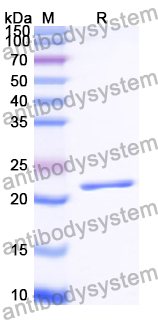Catalog No.
YHA87901
Expression system
E. coli
Species
Homo sapiens (Human)
Protein length
Glu688-Arg866
Predicted molecular weight
22.68 kDa
Nature
Recombinant
Endotoxin level
Please contact with the lab for this information.
Purity
>90% as determined by SDS-PAGE.
Accession
O60312
Applications
ELISA, Immunogen, SDS-PAGE, WB, Bioactivity testing in progress
Form
Lyophilized
Storage buffer
Lyophilized from a solution in PBS pH 7.4, 0.02% NLS, 1mM EDTA, 4% Trehalose, 1% Mannitol.
Reconstitution
Reconstitute in sterile water for a stock solution. A copy of datasheet will be provided with the products, please refer to it for details.
Shipping
In general, proteins are provided as lyophilized powder/frozen liquid. They are shipped out with dry ice/blue ice unless customers require otherwise.
Stability and Storage
Use a manual defrost freezer and avoid repeated freeze thaw cycles. Store at 2 to 8°C for frequent use. Store at -20 to -80°C for twelve months from the date of receipt.
Alternative Names
Phospholipid-transporting ATPase VA, 7.6.2.1, ATPase class V type 10A, Aminophospholipid translocase VA, P4-ATPase flippase complex alpha subunit ATP10A, ATP10A, ATP10C, ATPVA, ATPVC, KIAA0566
Novel phosphatidylinositol flippases contribute to phosphoinositide homeostasis in the plasma membrane., PMID:39258799
Methylation markers for anal cancer screening: A repeated cross-sectional analysis of people living with HIV, 2015-2016., PMID:38680109
An esophagus cell atlas reveals dynamic rewiring during active eosinophilic esophagitis and remission., PMID:38637492
The Immunoprotection of OmpH Gene Deletion Mutation of Pasteurella multocida on Hemorrhagic Sepsis in Qinghai Yak., PMID:36977260
Machine Learning for the Identification of a Common Signature for Anti-SSA/Ro 60 Antibody Expression Across Autoimmune Diseases., PMID:35635731
A novel circRNA-miRNA-mRNA network revealed exosomal circ-ATP10A as a biomarker for multiple myeloma angiogenesis., PMID:34852710
Maternal-fetal genetic interactions, imprinting, and risk of placental abruption., PMID:32972274
The N- or C-terminal cytoplasmic regions of P4-ATPases determine their cellular localization., PMID:32614659
Mutated ATP10B increases Parkinson's disease risk by compromising lysosomal glucosylceramide export., PMID:32172343
ATPase reaction cycle of P4-ATPases affects their transport from the endoplasmic reticulum., PMID:31571211
Subcongenic analysis of a quantitative trait locus affecting body weight and glucose metabolism in zinc transporter 7 (znt7)-knockout mice., PMID:30777014
Yeast and human P4-ATPases transport glycosphingolipids using conserved structural motifs., PMID:30530492
Substrates of P4-ATPases: beyond aminophospholipids (phosphatidylserine and phosphatidylethanolamine)., PMID:30509129
Proteomic Analysis and Functional Characterization of P4-ATPase Phospholipid Flippases from Murine Tissues., PMID:30018401
Phospholipid-flipping activity of P4-ATPase drives membrane curvature., PMID:29599178
Genome-Wide DNA Methylation Profiles of Phlegm-Dampness Constitution., PMID:29518789
Alteration of transbilayer phospholipid compositions is involved in cell adhesion, cell spreading, and focal adhesion formation., PMID:27277390
[Hypothalamus and behavior: the model Prader-Willi syndrome]., PMID:26979019
Phospholipid Flippase ATP10A Translocates Phosphatidylcholine and Is Involved in Plasma Membrane Dynamics., PMID:25947375
A gene variant in the Atp10d gene associates with atherosclerotic indices in Japanese elderly population., PMID:24125428
Deletions of IKZF1 and SPRED1 are associated with poor prognosis in a population-based series of pediatric B-cell precursor acute lymphoblastic leukemia diagnosed between 1992 and 2011., PMID:23823658
Transcriptome profiling of rabbit parthenogenetic blastocysts developed under in vivo conditions., PMID:23251477
Angelman syndrome and severe infections in a patient with de novo 15q11.2-q13.1 deletion and maternally inherited 2q21.3 microdeletion., PMID:23124039
ATP9B, a P4-ATPase (a putative aminophospholipid translocase), localizes to the trans-Golgi network in a CDC50 protein-independent manner., PMID:21914794
Novel biomarkers distinguishing active tuberculosis from latent infection identified by gene expression profile of peripheral blood mononuclear cells., PMID:21904626
A dual epigenomic approach for the search of obesity biomarkers: DNA methylation in relation to diet-induced weight loss., PMID:21209057
Altered ultrasonic vocalization and impaired learning and memory in Angelman syndrome mouse model with a large maternal deletion from Ube3a to Gabrb3., PMID:20808828
Role of UBE3A and ATP10A genes in autism susceptibility region 15q11-q13 in an Italian population: a positive replication for UBE3A., PMID:20609483
Atp10a, a gene adjacent to the PWS/AS gene cluster, is not imprinted in mouse and is insensitive to the PWS-IC., PMID:19894069
P4 ATPases - lipid flippases and their role in disease., PMID:19254779
Gender influences monoallelic expression of ATP10A in human brain., PMID:18726118
Gene expression profiles of human trabecular meshwork cells induced by triamcinolone and dexamethasone., PMID:18436822
Association study of the 15q11-q13 maternal expression domain in Japanese autistic patients., PMID:18186074
A type IV P-type ATPase affects insulin-mediated glucose uptake in adipose tissue and skeletal muscle in mice., PMID:16517145
Physical mapping of the pink-eyed dilution complex in mouse chromosome 7 shows that Atp10c is the only transcript between Gabrb3 and Ube3a., PMID:15620220
Mice heterozygous for Atp10c, a putative amphipath, represent a novel model of obesity and type 2 diabetes., PMID:15051828
On the conflicting reports of imprinting status of mouse ATP10a in the adult brain: strain-background-dependent imprinting?, PMID:12955587
Atp10a, the mouse ortholog of the human imprinted ATP10A gene, escapes genomic imprinting., PMID:12782135
Predominant maternal expression of the mouse Atp10c in hippocampus and olfactory bulb., PMID:12730723
Transbilayer phospholipid movement and the clearance of apoptotic cells., PMID:12531537
Mutation screening and transmission disequilibrium study of ATP10C in autism., PMID:11857573
A novel maternally expressed gene, ATP10C, encodes a putative aminophospholipid translocase associated with Angelman syndrome., PMID:11326269

